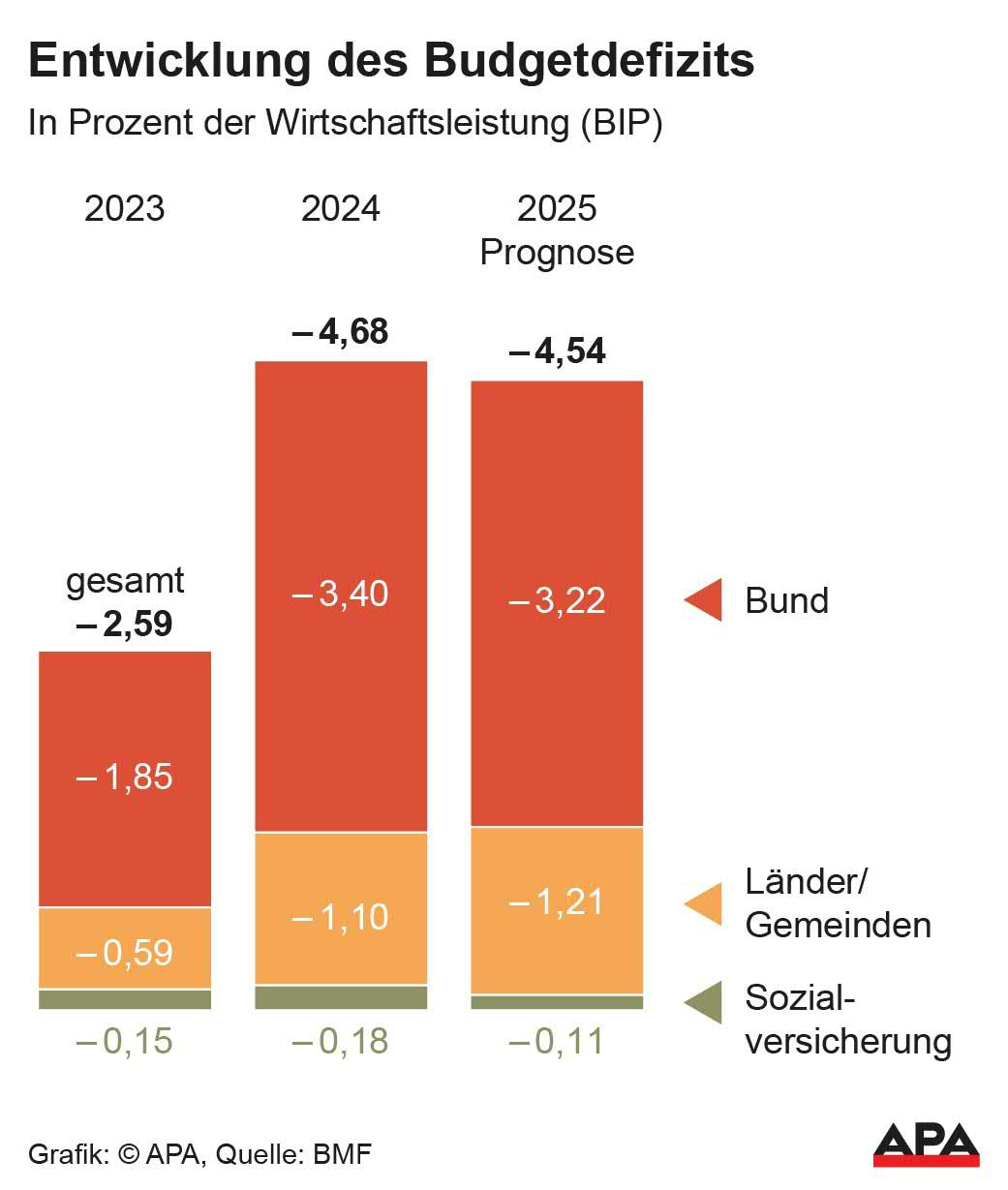Budget deficit to remain at 4.5 percent despite worse forecast

Finance Minister Markus Marterbauer (SPÖ) specifically expects a deficit of over 23 billion. This would correspond to 4.54 percent of GDP, instead of the originally forecasted 4.51 percent. The fact that the Maastricht balance has only minimally worsened despite the forecast deteriorating by a good billion is due to the fact that the nominal GDP has also increased accordingly.
Budget Deficit: Successful Federal Government - States and Municipalities Perform Worse Than Expected
Marterbauer emphasized that the federal government has performed quite successfully. In this sector, the deficit is significantly, specifically by a good 800 million, lower than assumed in April and is expected to land at 3.2 percent of GDP or 16.46 billion. State Secretary for Finance Barbara Eibinger-Miedl (ÖVP) attributes this, among other things, to the "strict execution." Maintaining the course is "a very important signal" towards Brussels and the capital markets.

In contrast, states and municipalities as well as social security perform significantly worse than the federal government. Here, the assumptions have worsened by nearly 1.4 billion and a good 440 million, respectively. The deficit is assumed to be 6.2 billion. According to Marterbauer, the municipalities are primarily responsible for the worse figures, but he simultaneously defended them.
"I believe there are really financing problems there." Therefore, the revenues and expenditures of the municipalities will still need to be addressed. Eibinger-Miedl pointed to the expansion of childcare services and high costs in the social sector.
Willingness to Discuss and Rejections of Municipal Demands
There was no rejection of the increase in property tax pushed by the municipalities, which the department head is willing to discuss, but there were rejections of two other demands. Marterbauer does not want to give the municipalities a share of the revenues from the bank levy or from CO2 taxation. Regarding the former, he argued that the municipalities have shown no interest in helping with bank bailouts, which the federal government has always had to shoulder. In terms of the CO2 tax, he needs the revenues because they are still dealing with the costs of the (now abolished) climate bonus.
The fact that things are going quite well at the federal level was attributed by representatives of the Ministry of Finance to both the strict enforcement and a favorable development in tax and contribution revenues, which compensate for the slightly higher expenditures. The economy has also developed better than predicted in the spring. The autumn forecast by economic researchers, which will follow in October, could show that things are continuing in the right direction. According to Marterbauer, there are a number of indications that the economy is developing better than expected.
The data presented today is based on figures from the federal government for the first nine months and those from the states and municipalities from the first half of the year. Therefore, Marterbauer sees a certain uncertainty factor but remains optimistic about reaching the 4.5 percent: "Our controlling reports suggest that we can achieve this." Updated forecasts for the year 2026 are to be presented in mid-October. Whether there will already be a civil servant agreement by then, which can be priced in accordingly, is open. Marterbauer did not want to comment on the status of the talks on Thursday but emphasized that a one percent increase would cost 189 million euros. He also did not want to comment on the Stability Pact or which states are having more difficulty with the budget than others.
Meanwhile, the third coalition partner continues to apply pressure. The reform spark ignited by the federal government must not be extinguished by the states, said NEOS budget spokesperson Karin Doppelbauer. Austria must comply with the EU spending rule - and this can only be achieved if the federal government, states, municipalities, and social insurance show discipline in spending together. Once again, she also called for the public service salary agreement to be reopened.
Criticism from the Opposition
Criticism comes from the opposition. The budget figures are miles above the EU requirements of a maximum of three percent, said FP budget spokesperson Arnold Schiefer. It has long been obvious that urgent reforms are necessary in all areas - whether in health, care, or education. But instead of finally taking action, the government allows the bloated state apparatus to continue to expand. Particularly at the federal level, savings are urgently needed.
The Greens, on the other hand, are focusing on the states. The biggest lever would still be the federalism reform and the disentanglement of responsibilities, and thus the introduction of real financial responsibility for the territorial authorities, said budget spokesperson Jakob Schwarz. But he also sees potential for savings at the federal level: "Because while money is lacking everywhere, the government is cementing billions into the Lobau tunnel and continues to hold on to climate-damaging subsidies."
(APA/Red)
This article has been automatically translated, read the original article here.





